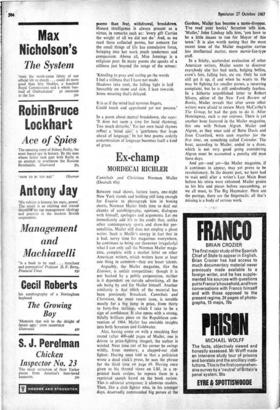Ex-champ
MORDECAI RICHLER
Between road shows, lecture tours, one-night New York stands and holding still long enough for Esquire to photograph him in boxing shorts, Norman Mailer finds time to deal out chunks of autobiography, opinions, dialogues with himself, apologies and arguments. Let me immediately add it's to his credit that, unlike other contemporary sports and show-biz per- sonalities, Mailer still does not employ a ghost writer. Such is Mailer's energy in fact that in a bad, nervy time for magazines everywhere, he continues to bring out (however irregularly) what I can only call the Norman Mailer maga- zine, complete with a market letter on other American writers, which writers have at least one thing in common—they are lesser talents.
Arguably, the Mailer magazine, like the Listener, is unfair competition: though it is not backed by a public corporation, neither is it dependent on outside advertising, all the ads being by and for Mailer himself. Another similarity is that niuch of the material has been previously broadcast. Cannibals and Christians, the most recent issue, is notable mostly for a big jump in price, from thirty to forty-five shillings, which I take to be a sign of confidence. It also opens with a strong, fitfully brilliant piece on the Republican con- vention of 1964. Mailer has enviable insights into both Scranton and Goldwater.
Alas, having come on with a smashing first round (after 400-odd pages of Mailer, one is driven to prize-fighting images), the author is winded. Next time out of his corner he swings wildly, from memory, a clapped-out club fighter. Having once told us that a politician wrote a dead stick's prose, he uses the phrase for the third time on page 69. Having once given us his shrewd views on LBJ, in a re- printed book review, he repeats them in a reprinted speech based on the book review. This is editorial arrogance; it alienates readers. Then, like a club fighter who, in his younger days, deservedly commanded big purses at the
Gardens, Mailer has become a name-dropper. 'I've read your books,' Scranton tells him. 'Mailer,' John Lindsay tells him, 'you have to be a little insane to run for Mayor of this town.' It is also worth noting that the most recent issue of the Mailer magazine carries less intellectual matter, more movie-fan-type stuff.
In a bitchy, scattershot evaluation of other American writers, Mailer seems to discover everybody else has bad teeth, bulging bellies, crow's feet, falling hair, etc etc. Only he can still get it up, if and when he wants to. He may be fighting for smaller purses, a recurring complaint, but he is still undoubtedly fearless. In a hitherto unpublished letter to Robert Silvers, editor of the New York Review of Books, Mailer reveals that after seven other writers were afraid to review Mary McCarthy's The Group, he had the guts to do it. After Hemingway, such is our Co Jones. There is yet another bout featured in the Mailer magazine, this one with Nelson Algren. Mailer and Algren, as they once said of Bette Davis and Joan Crawford, were seen together for the first time, on something called Calendar. The bout, according to Mailer, ended in a draw, which is not very good going considering Algren must be accounted a punchy old man these days.
And yet—and yet—the Mailer magazine, if it continues to appear, may yet prove to be revolutionary. In the decent past, we have had to wait until after a writer's Last Main Bout before his trivia were exhumed. Mailer grants us his bits and pieces before succumbing, as we all must, to The Big Haymaker. Here are the parings, there are the fingernails; all that's missing is a body of serious work.










































 Previous page
Previous page